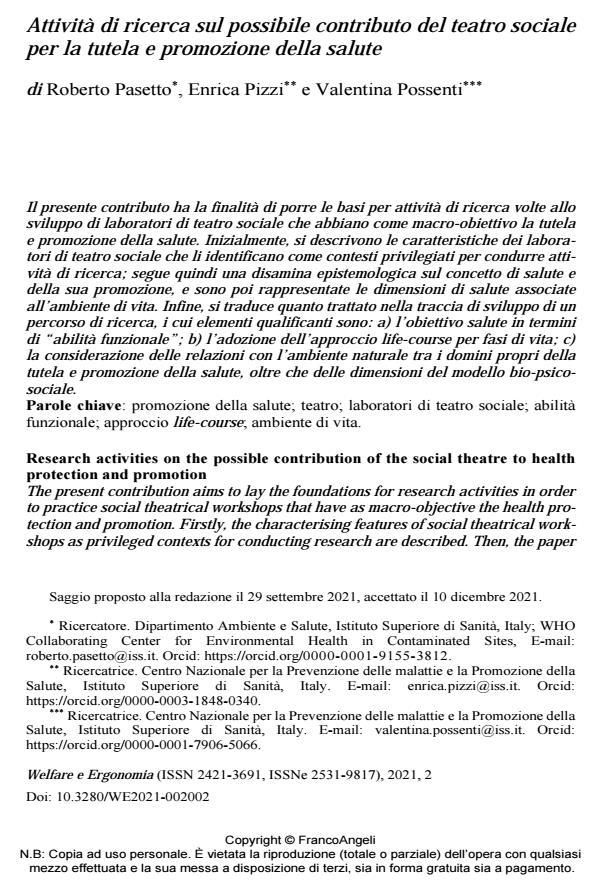Attività di ricerca sul possibile contributo del teatro sociale per la tutela e promozione della salute
Titolo Rivista WELFARE E ERGONOMIA
Autori/Curatori Roberto Pasetto, Enrica Pizzi, Valentina Possenti
Anno di pubblicazione 2022 Fascicolo 2021/2
Lingua Italiano Numero pagine 15 P. 23-37 Dimensione file 339 KB
DOI 10.3280/WE2021-002002
Il DOI è il codice a barre della proprietà intellettuale: per saperne di più
clicca qui
Qui sotto puoi vedere in anteprima la prima pagina di questo articolo.
Se questo articolo ti interessa, lo puoi acquistare (e scaricare in formato pdf) seguendo le facili indicazioni per acquistare il download credit. Acquista Download Credits per scaricare questo Articolo in formato PDF

FrancoAngeli è membro della Publishers International Linking Association, Inc (PILA)associazione indipendente e non profit per facilitare (attraverso i servizi tecnologici implementati da CrossRef.org) l’accesso degli studiosi ai contenuti digitali nelle pubblicazioni professionali e scientifiche
Il presente contributo ha la finalità di porre le basi per attività di ricerca volte allo sviluppo di laboratori di teatro sociale che abbiano come macro-obiettivo la tutela e promozione della salute. Inizialmente, si descrivono le caratteristiche dei laboratori di teatro sociale che li identificano come contesti privilegiati per condurre attività di ricerca; segue quindi una disamina epistemologica sul concetto di salute e della sua promozione, e sono poi rappresentate le dimensioni di salute associate all’ambiente di vita. Infine, si traduce quanto trattato nella traccia di sviluppo di un percorso di ricerca, i cui elementi qualificanti sono: a) l’obiettivo salute in termini di "abilità funzionale"; b) l’adozione dell’approccio life-course per fasi di vita; c) la considerazione delle relazioni con l’ambiente naturale tra i domini propri della tutela e promozione della salute, oltre che delle dimensioni del modello bio-psico-sociale.
Parole chiave:promozione della salute; teatro; laboratori di teatro sociale; abilità funzionale; approccio life-course; ambiente di vita.
Roberto Pasetto, Enrica Pizzi, Valentina Possenti, Attività di ricerca sul possibile contributo del teatro sociale per la tutela e promozione della salute in "WELFARE E ERGONOMIA" 2/2021, pp 23-37, DOI: 10.3280/WE2021-002002